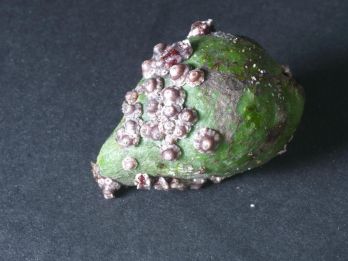Fig wax scale
Fig wax scale (Ceroplastes rusci) is a species that feeds on the leaves, stems, branches, and fruit of its hosts.
Background
Fig wax scale is distributed world-wide. Active crawlers hatch from their eggs and spread to feeding sites nearby.
Long distance spread occurs when crawlers are carried on the wind, by other animals, or on plants moved within the horticultural trade.
In Australia, each female lays about 300 eggs, but it is estimated that 50% of crawlers are lost in the first 24 hours after hatching. Males are unknown in most countries.
Impacts
Damage from fig wax scale occurs in 2 ways:
- directly through feeding
- indirectly by buildup of sooty mould fungi on leaf surfaces, reducing photosynthesis.
Both of these actions can weaken plants, causing leaf loss, dieback, and death. Usually, direct damage is minor.
Management
An oil spray can reduce numbers of fig wax scale, if timed correctly and applied thoroughly.
It must be used when crawlers are emerging, and first stage nymphs are settling on the leaves of the host plant. This is the only opportunity when the insects are vulnerable enough for the spray to be effective.
Identification
Fig wax scale is often found on the upper surfaces of leaves, in lines along the midribs.
As they suck sap from the plants, the excess is expelled as honeydew which covers the foliage with sugary substances. This becomes colonised by black fungal growth and ants tend the scales to collect the honeydew.
Eggs are red, laid under the pale pink to red hard shell of the female.


